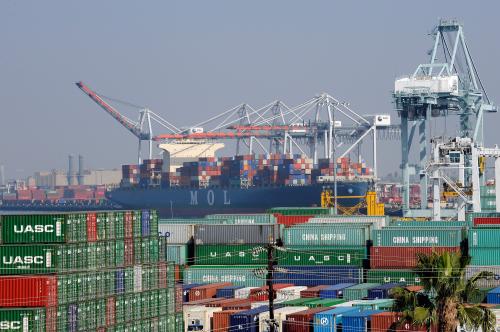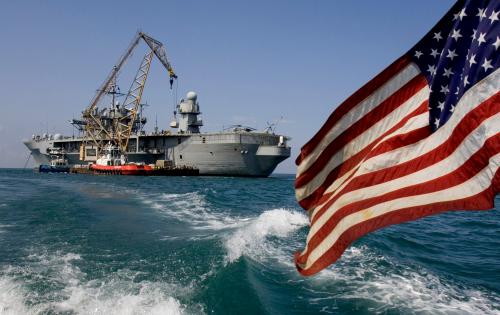What role do trade agreements play in strengthening U.S. global competitiveness? How can increasing foreign investment opportunities for U.S. companies not just bolster the American economy, but the world economic order and the liberal international order more broadly? In a recent event at Brookings, I discussed these and related topics with Suzanne Nora Johnson of the Brookings Board and Senior Fellow Robert Kagan. The bottom line is that America plays an extraordinary role in the world, and we shouldn’t lose sight of the need for U.S. leadership in shaping the rules of 21stcentury trade and commerce.
Question, from Suzanne Nora Johnson: What is the strategic importance of Obama administration priorities like the Trans-Pacific Partnership (TPP), the Transatlantic Trade and Investment Partnership (TTIP), and the G-20?
Answer: Trade agreements like TPP and TTIP enable us to set rules and standards for trade in the 21st century, which is an essential component of U.S. leadership in the world. Trade agreements allow us to shape relationships—they empower us to help set labor and environmental standards, rules for e-commerce, and intellectual property and trade secret protections. And they strengthen our national security, since we have better relations with countries where there is a strong U.S. commercial presence.
With TPP, specifically, we want to ensure that our companies to have access to the countries that have the fastest-growing middle classes on earth. There is real demand for American products and services across Asia, but there are currently barriers to entry—and we don’t want our companies left behind.
Trade agreements like these have tremendous benefits for the United States: one-quarter of our growth from 2000 to 2015 occurred due to our ability to export, and 11.5 million Americans go to work every day because their companies export overseas. We should make no mistake: not only would rejecting TPP be a catastrophic mistake, even delays in finalizing trade deals cost us money and jobs at home.
In the United States and elsewhere, there is understandable anxiety about globalization and digitalization. But both of those trends will continue to shape the world economy regardless of whether or not we complete and enact trade agreements. In fact, those agreements are our best answer to the challenges that come with globalization and automation. They help us shape the rules and guide how globalization proceeds to best protect the interests of Americans.
Q: As Secretary of Commerce, you have referred to “commercial diplomacy.” Can you explain what you mean by that, as well as what role the private sector can play in that effort?
A: Countries aren’t just judged by their military power or their diplomatic power—they’re judged by their commercial and economic power, too. Even though American commercial power is unparalleled around the world, I believe that the American private sector—as a national asset—is being underutilized vis-à-vis its potential. That’s understandable, since the impact of the private sector is dispersed firm by firm and rarely measured in aggregate. But the reality is that U.S. companies are often the face of America in many places.
Leaders around the world say they like U.S. companies because of how they behave and because they follow the rules. Nevertheless, across the globe today, there are still barriers to access for U.S. companies. Commercial diplomacy is a pretty simple concept: recognizing that the U.S. private sector is a major asset in shaping policy around the world, the U.S. government and private sector can work side by side with foreign governments to help improve policy.
In many countries, there is a disconnect between policies they’ve enacted and stated goals for foreign direct investment and economic growth. By bringing U.S. business leaders into direct conversation with leaders of foreign governments, we can better illustrate how some policies—for instance, ones that undermine e-commerce or intellectual property rights, or that inhibit entrepreneurship—contravene their national goals. So, commercial diplomacy has enormous appeal: countries recognize they’re competing for foreign direct investment and foreign capital, and bringing public- and private-sector stakeholders to the same table helps countries identify and implement policies that make them more competitive.
This is the definition of a kind of win-win diplomacy: by creating new opportunities for American companies while helping set the stage for stronger growth in partners across the world, the United States helps knit together a future of shared peace and prosperity.
Q: Patterns of international trade and investment are changing, as Asian economies grow in relative economic strength and Europe is experiencing relative economic decline. How do you recommend that U.S. firms think about these geopolitical dimensions?
A: U.S. companies need to be geopolitically savvy these days. Economies around the world are evolving, with emerging markets in flux in a range of unique ways, and it can be tough for companies to adapt.
It’s not enough for firms to be cognizant of geopolitics—success requires engagement from both American firms and the U.S. government to shape trade and investment climates. I see it as being an important role of the Department of Commerce to foster direct dialogue between companies and governments around the world—both to identify challenges to investment and entrepreneurship and to ensure a level playing field for international competition. Leaders across the globe say they want more investment from U.S. firms and better opportunities for trade, but can at times enact policies that put up hurdles. The U.S. government and its private companies can play key roles in helping to shape those environments, to the benefit of both American and foreign companies.
Most fundamentally, the United States must continue to lead the way in fostering global political stability and economic openness. Without that foundation, uncertainty will hamper markets. American global leadership remains the sine qua non for promoting American economic growth and increasing levels of growth across the world.





Commentary
Why U.S. leadership on trade and investment is a linchpin of the international liberal order
June 8, 2016